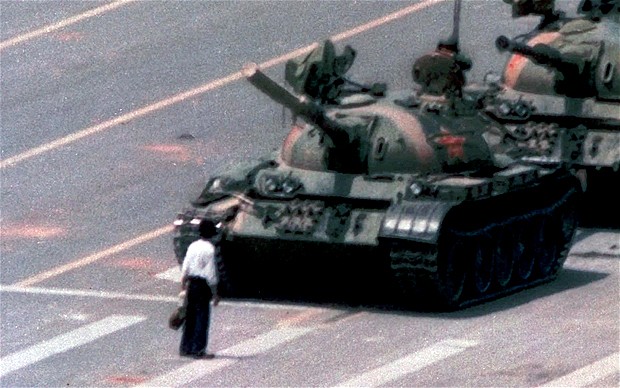BEIJING (AP) — Activists in China are taking to social media to urge the public to wear black on the 24th anniversary of the bloody military crackdown on protesters who had camped out for weeks on Tiananmen Square.
Videos By Rare
The crackdown on pro-democracy protesters on June 4, 1989, killed hundreds, possibly more. The Chinese government has never fully disclosed what happened on that day and branded the protests a “counterrevolutionary riot.” It remains a taboo topic inside the country, but the growing use of Twitter-like sites known as Weibo and other social media — although largely censored — has made it difficult for authorities to control all information about the Tiananmen crackdown.
Beijing-based rights activist Hu Jia said he had been appealing online for people to wear black T-shirts on Tuesday or light a candle at home on Monday evening to remember the event.
“Thanks to the role of Weibo, there are now more people than any other time in the past 24 years that have come to know and think about the incident,” he said.
While protests in mainland China are off-limits, tens of thousands have gathered to mark the anniversary in past years in Hong Kong’s Victoria Park. The territory — returned by the British in 1997 — operates under a separate political system that promises freedom of speech and other Western-style civil liberties.
“When the spreading of information gains momentum, sooner or later, one day a torch will be relayed from Victoria Park in Hong Kong to Tiananmen Square in Beijing,” Hu said.
Because of restrictions placed on him as an activist, Hu will be unable to leave his home to mark the anniversary. He said controls placed on him for this year’s event — the first since Xi Jinping became leader — were tighter than before.
An academic from Guangzhou, Ai Xiaoming, said she was answering an artist’s call on Google Plus for people to send photos of themselves wearing black for an online photo collection to mark the anniversary.
“More and more people would like to know the truth about the incident, which makes the authorities more nervous,” she said. “Although it’s difficult for people to get access to publications in China, they are able to get information through channels such as social media. People face suppression, detention, arrest and even conviction, but the information can’t be completely blocked. People have never stopped remembering the incident.”
The event has left deep, emotional scars on some of those involved in the crackdown. A former People’s Liberation Army soldier who was deployed to the vicinity of the square to help clear out the protesters said in an interview Monday that the crackdown forever changed his perspective.
“When you’re holding your gun and facing a lot of students, and you know that they are students, your heart is filled with a deep terror,” said Chen Guang, now a Beijing-based artist. Since Chen left the army to pursue art, he has painted a number of pieces depicting the aftermath of the crackdown as a way of remembering the event.
Chen said he was a 16-year-old soldier when his unit was sent to the Great Hall of the People to deliver ammunition and later was mobilized in a nighttime face-off with protesters on the steps of the Stalinist-era building fronting the square. Like many other troops around him, he said, he fired his gun at the sky but not at students. He could hear gunfire from all around the square as other troops moved in to crush the demonstrations.
In the morning as he and other troops cleaned the square of the students’ belongings, some of them burned in large bonfires, he wondered about the protesters. They left tents, books, a stray sandal, banners and military-style overcoats that were trendy at the time. “Who were these students that stayed here? Where are they now? What has happened to them?” — such questions have remained on his mind for more than two decades, Chen said.
The artist said he hoped the government would allow an unfettered discussion of the event to learn from its mistakes. “A country is like an individual. It should be able to come across information about this in a normal way. Then you will reflect on what you’ve done wrong in the past, or what you did not do well,” Chen said. “The Communist Party lacks the ability to reflect, or it keeps such reflections within the internal power structure.”
Last week, the U.S. State Department called on the Chinese government to fully account for those killed, detained or missing in the 1989 crackdown and to end the ongoing harassment of human rights activists and their families.
“Over 20-odd years, China has achieved great success economically, socially and culturally, and Chinese people enjoy wide-ranging freedom and rights, which everybody can see,” Foreign Ministry spokesman Hong Lei said Monday at a regular news briefing.
“We hope the relevant country will discard prejudice, respect facts and not use the issue to interfere in China’s internal affairs or affect the growth of China-U.S. relations,” Hong said.
Associated Press writer Gillian Wong contributed to this report.

